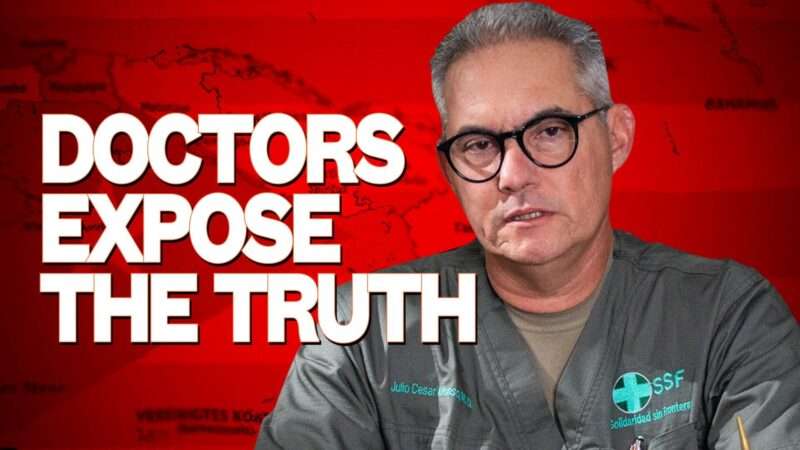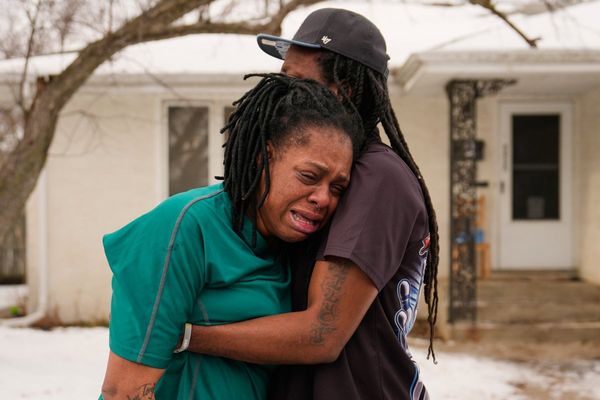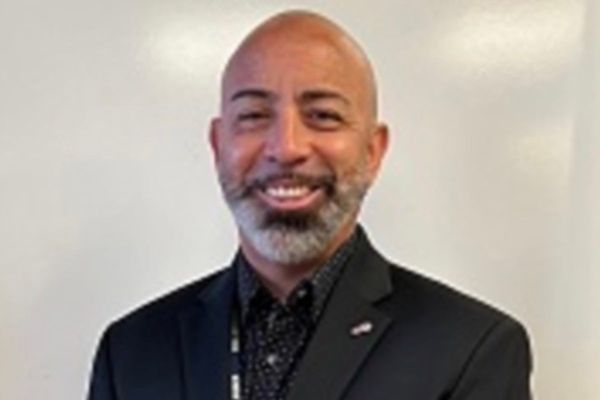
"If there's one thing they do right in Cuba, it's health care," said Michael Moore in a 2007 interview. "Cuba has the best health care system in the entire area," according to Angela Davis, "and in many respects much better than the U.S."
"One thing that is well established in the global health community is the strength of the Cuban national health system," said Clare Wenham, a professor at the London School of Economics.
Claims like these have appeared in hundreds of documentaries, newspaper articles, and magazine features over the years celebrating the supposed marvel of Cuba's health care system. It's a testament to the effectiveness of the Castro regime's propaganda apparatus that this myth, so deeply at odds with reality, has persisted for so long.
"The Cuban health care system is destroyed," Rotceh Rios Molina, a Cuban doctor who escaped the country's medical mission while stationed in Mexico, tells Reason in Spanish. "The doctor's offices are in very bad shape."
"People are dying in the hallways," says José Angel Sánchez, another Cuban doctor who defected from the medical mission in Venezuela, interviewed by Reason in Spanish.
According to Rios, Sánchez, and others with firsthand experience practicing medicine in Cuba, the island nation's health care system is a catastrophe. Clinics lack the most routine supplies, from antibiotics to oxygen and even running water, and their hallways are often occupied by ailing patients because there aren't enough doctors to treat their most basic needs. Cuban hospitals are unsanitary and decrepit. It's exactly what you'd expect in a country impoverished by communism.
The only thing that's changed is that because of social media and the COVID-19 pandemic, the government's propaganda facade has finally started to shatter.
And yet in 2021, some journalists were falling for the claim that the Cuban government had set the model in its response to COVID-19. By July of that year, ordinary Cubans had taken to the streets—and to Twitter and Facebook—in part to call attention to what the pandemic had actually meant for Cuban hospitals and clinics.
In the 15 years since the release of Michael Moore's documentary Sicko, which celebrated Cuban health care, everyday citizens have been armed with smartphones, Twitter, Instagram, and Facebook, empowering them to tell the truth about what it's really like to walk into a Cuban hospital.
So how did the Castro regime's propaganda machine manage to fool so many for so long? According to Maria Werlau, executive director of the Cuba Archive, the answer lies with Cuba's foreign medical missions, which are teams of health care professionals dispatched to provide emergency and routine care to foreign countries.
The first medical mission was sent to Algeria in 1963. After the fall of the Soviet Union, when the government lost its major source of aid, the program was ramped up significantly as a source of revenue for the impoverished nation.
The Cuban government has promoted the missions as a humanitarian endeavor, and a demonstration of the community spirit and selflessness central to the communist project. In his 1960 speech "On Revolutionary Medicine," the Marxist revolutionary Che Guevara said that "Individualism…must disappear in Cuba." He recounted the story of a group of physicians in Havana "who demanded remuneration" before going into the country's rural areas to treat the sick. He dreamed of replacing them with a new class of doctors drawn from the peasantry who would "run, immediately and with unreserved enthusiasm, to help their brothers."
Rios participated in the medical mission in Sierra Leone in 2013, where health care specialists from around the world came to help contain the Ebola epidemic. The members of the mission were told that when they returned to Cuba, they would be received as heroes. Rios says that, while he did receive a stipend that went to cover his living expenses, medical personnel from other countries were generously compensated.
The myth of Cuban physicians as selfless healers started to fracture in 2000 when two doctors from the mission in Zimbabwe slipped a note to an airline official with the handwritten word kidnapped. They had denounced the Castro regime and were being brought back to Cuba against their will, possibly to face jail time. Instead, they wound up in the U.S. and were granted political asylum.
In a 2020 report, Human Rights Watch said the Cuban medical missions "violate [doctors'] fundamental rights," including "the right to privacy, freedom of expression and association, liberty, and movement, among others." It noted that "many doctors feel pressured to participate in the missions and fear retaliation if they do not," and that "governments that accept Cuban assistance that includes the abusive conditions imposed by Cuba risk becoming complicit in human rights violations."
In 2006, the George W. Bush administration created the Cuban Medical Professional Parole Program, granting health care workers stationed abroad permanent resident status. All they had to do was make it to a U.S. embassy. Over 7,000 medical workers took advantage of the program.
In 2014, the New York Times op-ed page published an editorial calling for an end to the program. American immigration policy "should not be used to exacerbate the brain drain of an adversarial nation," it noted. In other words, the rights of doctors to decide where and how to live should be subordinate to what was best for the Cuban government.
After the mission in Sierra Leone, Rios was redeployed to a military base in Mexico. One day, he was sent with a group of doctors to buy some phone cards so they could connect with their relatives back home. He decided to make his escape. Rios found a job at a Mexican pharmacy and started saving money to pay a coyote to bring him into the U.S. He was picked up by border officials, and taken to an immigrant detention center for 42 days. After his release, he could join his family in Miami.
In 2018, a group of Cuban doctors who defected from the medical missions sued the Pan American Health Organization, which is part of the World Health Organization, for aiding in human trafficking and for earning $75 million in fees by acting as a middle man.
The medical missions are primarily a way of selling Cuban health care services abroad. So what's health care like for those living on the island?
Julio Cesar Alfonso is the president of the Miami-based Solidarity Without Borders, which helps Cuban doctors who have escaped. He says that there are two health care systems in Cuba—one that is used by the majority of regular citizens, and another that is reserved for tourists and the Cuban elite.
When defenders of Cuban health care acknowledge its deficiencies at all, they usually point the finger at the U.S. trade embargo, which has been in place since 1962. But the deplorable conditions in Cuban hospitals have more to do with a lack of basic health care supplies, which are readily available from other countries, such as antibiotics and steroids. Cuban hospitals also have a shortage of beds and stretchers, and some were without water for six to 12 hours a day at the height of the pandemic.
So what impact does the embargo really have on Cuban health care? Medical products have been technically exempt from the embargo since the passage of the 1992 Cuba Democracy Act. But the law does stipulate that U.S. companies need a license in order to sell to Cuba—and critics are correct to point out that this requirement adds red tape to the process. Total U.S. health care products purchased by Cuba from 2003 to 2021 averaged a mere $1.4 million annually, in what should be a $50 to $100 million market. But it's not the licensing process that accounts for such paltry sales; companies would gladly obtain permission to sell their products to Cuba if they could earn enough money to make it worth the effort. Cuba has a severe foreign currency shortage because it produces little in the way of goods and services that the rest of the world apart from the U.S. wants to buy.
Promoters of Cuban health care often cite the country's infant mortality rate as evidence of its success. "How is this possible" that "an American infant is, by official statistics, almost 50 percent more likely to die than a Cuban infant," wrote Nicholas Kristof in a 2019 New York Times column that looked at one of the most often repeated figures in support of the claim that there's something exceptional about Cuba's health care system.
While conceding that "the figures should be taken with a dose of skepticism," Kristof chose to interpret them regardless in support of his priors: "Cuba has the Medicare for All that many Americans dream about."
Cuba has a variety of strategies for manipulating its infant mortality rate, such as seeing to it that fetuses less likely to survive outside the womb never get the chance. There's significant evidence that Cuban doctors coerce women into aborting fetuses shown to have abnormalities after routine ultrasounds.
Vincent Geloso, who's an assistant professor of economics at George Mason University, co-authored a 2018 paper arguing that Cuba's low infant mortality rate is the result of misclassification using a different indicator known as "late fetal deaths."
Despite reports early in the pandemic that Cuba was an outlier in its success in combating COVID-19, by August of 2021 The New York Times was reporting that Cuba's health care system was "reeling," with oxygen supplies running low, a shortage of syringes, and mortuaries and crematories "overwhelmed." Cuban President Miguel Díaz-Canel blamed the U.S. trade embargo.
Sánchez thinks that, as the Castros' health care myth crumbles, ordinary Cubans are beginning to realize that they are not threatened by foreign enemies, as the regime propaganda machine has claimed for decades.
"The only enemy of the Cuban people," he says, "is the Cuban government."
Written and hosted by Daniel Raisbeck and Jim Epstein; narrated by Daniel Raisbeck; edited by John Osterhoudt; camera by Epstein, Osterhoudt, Isaac Reese, and Meredith Bragg; graphic design by Nathalie Walker; animations by Reese and Osterhoudt; additional editing support by Regan Taylor; additional research by Alexandra De Caires; translation assistance by María Jose Inojosa Salina; English subtitles by Caitlin Peters.
Photo credits: KRISTIN CALLAHAN - ACEPIXS.COM/Newscom; KEYSTONE Pictures USA/ZUMAPRESS/Newscom; United Nations Photo/Flickr/Creative Commons; Claudio Furlan/ZUMA Press/Newscom; Ipa/ZUMA Press/Newscom; Ipa/ZUMA Press/Newscom; Claudio Furlan/ZUMA Press/Newscom;United Nations Photo/Flickr/Creative Commons; */Kyodo/Newscom; RG72/wikimediacommons/Creative Commons; IAEA Imagebank/Flickr/Creative Commons; Sandrine Huet / Le Pictorium/ZUMA Press/Newscom; Jonathan Alpeyrie/Polaris/Newscom; Angelo Cozzi/ZUMA Press/Newscom; Ernesto Mastrascusa/EFE/Newscom; Eye Ubiquitous/Newscom; Eye Ubiquitous/Newscom; Kike Calvo/ZUMA Press/Newscom; Eye Ubiquitous/Newscom
The post The Myth of Cuban Health Care appeared first on Reason.com.







